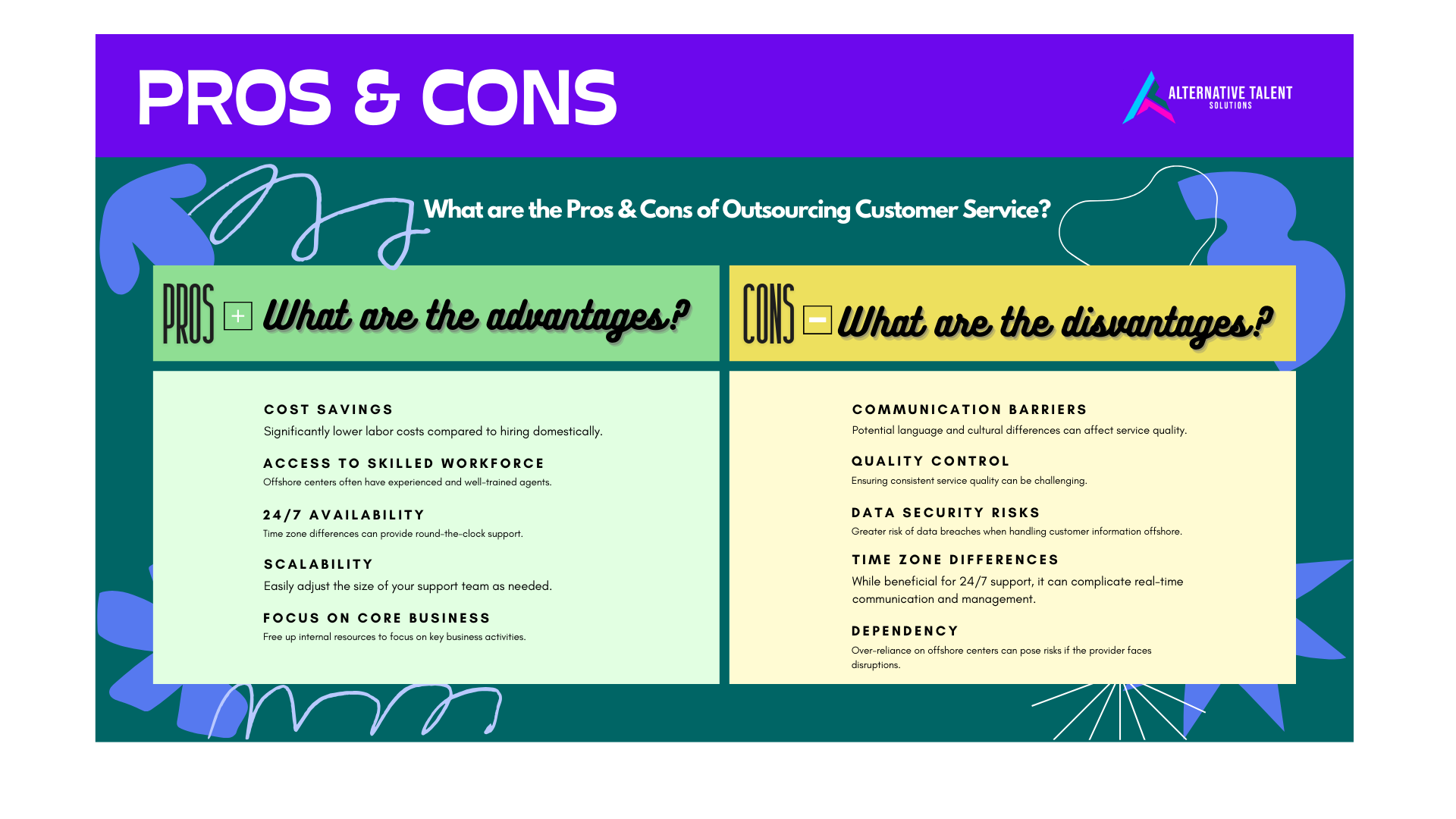Offshore customer service has become a popular strategy for businesses looking to enhance efficiency and reduce costs. By relocating customer service operations to countries with lower labor costs, companies can achieve significant cost savings. However, this approach comes with its own set of challenges. In this article, we will explore the pros and cons of outsourcing customer service and its impact on business processes, customer experience, and the bottom line.
Understanding Outsourcing Customer Service
Customer service outsourcing involves transferring customer support operations to a different country, often to take advantage of lower labor costs and operational efficiencies. This can include setting up offshore call centers or partnering with third-party contact centers to handle customer inquiries, complaints, and support requests.
Check out our Ultimate Guide to Outsource Customer Service for Your Business
What Are the Pros and Cons of Outsourcing Customer Service?

Recent statistics indicate that the outsourcing industry is projected to achieve a total revenue of $405.6 billion by 2027. The increasing popularity of outsourcing is driven by its numerous benefits.
Pros of Outsourcing Customer Service
1. Cost Savings
One of the most significant advantages of offshoring customer service is cost savings. Labor costs in many offshore locations are substantially lower than in the home country. Reducing operational costs can improve the bottom line and allow businesses to allocate resources more effectively.
2. 24/7 Customer Service
Offshoring enables businesses to provide 24/7 customer service. By leveraging different time zones, companies can ensure that customer service representatives are available around the clock, enhancing the overall customer experience.
3. Scalability
Offshore call centers offer the flexibility to scale operations up or down based on demand. This adaptability is particularly beneficial during peak seasons or when launching new products or services.
4. Focus on Core Business Processes
By outsourcing customer support, businesses can focus on their core competencies and strategic initiatives. This allows in-house teams to concentrate on innovation and growth while the offshore team handles routine customer service tasks.
Cons of Outsourcing Customer Service
1. Quality Control
Maintaining quality control can be challenging with offshore customer service. Differences in training, management practices, and local standards can impact the quality of customer interactions. Regular monitoring and stringent quality control measures are essential to ensure consistent service levels.
2. Cultural and Language Barriers
Cultural and language barriers can affect communication between customer service representatives and customers. Misunderstandings or language difficulties can lead to frustration and a poor customer experience. It is crucial to invest in comprehensive training to mitigate these challenges.
3. Data Security Concerns
Offshoring customer service operations can pose data security risks. Protecting sensitive customer information from potential data breaches requires robust security protocols and regular audits to ensure compliance with data protection regulations.
4. Customer Perception
Some customers may have negative perceptions of offshore customer service. Concerns about communication difficulties or a perceived lack of local knowledge can impact customer satisfaction. Addressing these perceptions through transparent communication and high-quality service delivery is important.
Check our content on How to Improve Customer Satisfaction with Outsourced Support
Balancing the Pros and Cons of Outsourcing Customer Service
To maximize the advantages of offshoring while mitigating its drawbacks, businesses should consider the following strategies:
- Select the Right Partner: Choose a reputable offshore provider with a proven track record in your industry. Look for partners that prioritize quality control and have strong security measures in place.
- Invest in Training: Provide comprehensive training to offshore customer service representatives. This should include cultural sensitivity training, language skills development, and detailed knowledge of your products and services.
- Implement Robust Quality Control: Regularly monitor performance and conduct audits to ensure high service standards. Collect customer feedback to identify areas for improvement and address any issues promptly.
- Leverage Technology: Utilize advanced customer support technologies to enhance efficiency and accuracy. Tools like AI-powered chatbots, CRM systems, and analytics can improve response times and the overall customer experience.
What to Consider Before Outsourcing Customer Service to an Offshore Call Center
Outsourcing your call center to an offshore provider can be a strategic move for many businesses. However, there are several important factors to consider before making this decision to ensure it enhances customer experience and meets your business needs.
1. Cost Savings vs. Quality
One of the main reasons companies consider outsourcing their customer service department is the potential for significant cost savings. Offshore call centers offer lower labor costs compared to domestic options. However, weighing these savings against potential impacts on service quality is crucial. Ensure that the offshore provider can meet your company’s quality standards and that the cost savings do not come at the expense of customer satisfaction.
2. Cultural and Language Differences
Effective communication is essential in customer service operations. Cultural and language differences between your customers and the offshore agents can affect the quality of service. It’s important to choose a call center with agents who are proficient in your customers’ language and understand their cultural nuances. Training and ongoing support can help bridge any gaps, ensuring that the call center service meets the customers’ expectations.
3. Time Zone Challenges
Operating in different time zones can either be an advantage or a challenge. While it allows for extended customer service hours, it can also lead to coordination issues. Ensure that your offshore partner can provide the level of coverage you need and that there are clear communication protocols to manage time zone differences effectively. Understanding how call centers operate in various time zones can help optimize your customer service department’s performance.
4. Data Security and Privacy
Outsourcing customer support involves sharing sensitive customer information with a third party. It’s essential to ensure that the offshore call center adheres to strict data security and privacy standards. Verify their compliance with relevant regulations and their ability to protect your customers’ data.
5. Reputation and Reliability
The reputation and reliability of the offshore call center are critical. Research the provider’s track record, seek references, and read reviews from other clients. A reliable partner should have a proven history of delivering high-quality customer service and maintaining strong client relationships.
6. Technology and Infrastructure
The technological capabilities and infrastructure of the offshore call center are important considerations. Ensure that they have the necessary technology to integrate with your systems, support omnichannel customer service, and provide real-time reporting and analytics. Reliable internet and communication infrastructure are also crucial to avoid service disruptions. The right call center solutions can greatly enhance customer experience and operational efficiency.
7. Scalability and Flexibility
Your business needs may change over time, and it’s important to choose an offshore call center that can scale with your requirements. Evaluate their ability to handle increased call volumes, seasonal spikes, and any other fluctuations in demand. Flexibility in terms of contract terms and service levels can also be beneficial.
8. Training and Development
The quality of customer service provided by offshore agents depends on their training and development. Assess the call center’s training programs and their ability to develop their agents’ skills continually. Providing your own training materials and collaborating on training initiatives can help ensure that the agents are well-prepared to represent your brand and meet the standards of your customer service department.
9. Performance Metrics and Accountability
Establish clear performance metrics and accountability measures with your offshore call center. Regularly monitor their performance against these metrics and conduct regular reviews to ensure that they are meeting your expectations. Transparency and open communication are key to maintaining a successful outsourcing partnership. Effective business process outsourcing requires consistent evaluation and adjustments to align with business goals.
By carefully considering these factors, you can decide whether outsourcing customer service to an offshore call center is the right choice for your business. If managed effectively, this strategic move can lead to cost savings and improved service levels, ultimately enhancing the overall customer experience.
Conclusion
Outsourcing customer service offers a range of benefits, including cost savings, scalability, and the ability to provide 24/7 support. However, it also presents challenges related to quality control, cultural and language barriers, and data security. Businesses can successfully navigate these challenges and enhance their customer support operations by carefully selecting partners, investing in training, implementing quality control measures, and leveraging technology.
In conclusion, understanding the pros and cons of outsourcing customer service is essential for making informed decisions that benefit both your business and your customers. With the right approach, offshoring can be a valuable strategy for improving efficiency, reducing costs, and providing exceptional customer service.







